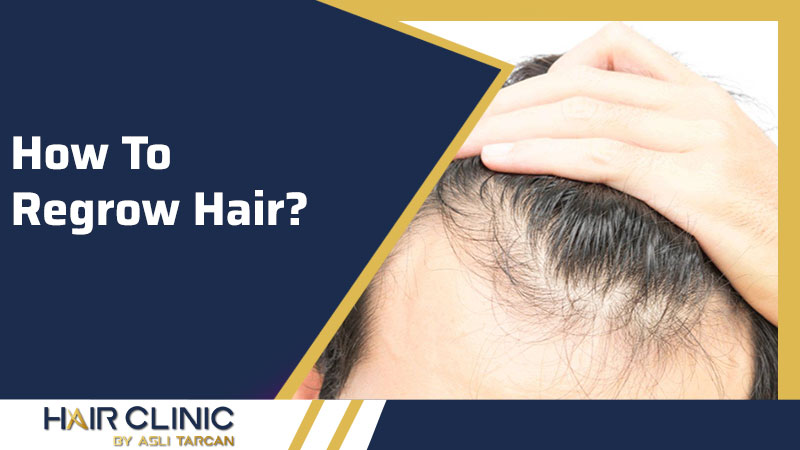How To Regrow Hair? Is it really possible to regenerate hair? There is a lot of mythology and misunderstanding in the world of males. It is possible for the hair to become stronger, but new hair follicles cannot grow in place of the shed hair follicles. So how to regrow hair, what can be used for this?
Every guy is in danger of losing his hair, a little faster than the others. The follicle itself shrinks and nothing can be regenerated. This type of hair loss is called androgenetic alopecia, often referred to as male pattern baldness. (This is the permanent type, not the temporary thing that sometimes happens due to stress.) This is done in two ways: thinning each hair and losing total density. However, in some cases of alopecia, these losses are not really “permanent”. At least, not immediately. Sometimes, it can be slowed down or delayed.
There’s hope! If you have lost hair or if you think you are at risk of losing weight, then read on for some possible corrections.
What are the natural options for “how to regrow hair”?
When it comes to preventing hair loss or improving the hair it already has, there are many natural methods that help. There are a variety of treatments that people use to rejuvenate their hair. However, it is important to remember that research to support such methods is not always extensive.
There are many common myths about lifestyle approaches or treatments that can help hair regeneration and it is often difficult to determine the fact from fiction.
Here we will explore what works and what does not work.
Quick facts about how to regenerate hair naturally:
- Haircare is an important part of preventing hair loss.
- Many nutrient deficiencies can lead to hair loss.
- Although it is more common in men, women can also lose their hair.
- Lifestyle techniques and methods
There are many treatments and techniques that people can try. Including:
Hair care
- Dyeing and brushing your hair can cause hair loss while washing your hair often and using styling products will not.
- There are some misconceptions about whether haircare contributes to hair loss and regeneration.
- For example, washing hair very often does not cause hair loss. Dry hair can cause hair loss because it can damage, burn, or dry out the hair – however, this hair will grow back.
- Hair dye is another cause of temporary hair loss – most hair dye treatments contain chemicals that can damage the hair and cause it to fall out.
- Excessive brushing can cause injury, which can lead to hair loss, and certain hairstyles, such as tight braids, ponytails, or corns, can cause hair loss because there is too much tension in the hair.
However, hair care products such as gels, mousses, or hair sprays do not cause hair loss.
Massage
A study conducted in Japan showed that massaging the scalp can increase the thickness of the hair. The men in the study had regular massages for 24 weeks and while their hair growth rate did not improve, their thickness improved significantly.
The researchers believe that this could be related to increased blood flow and immediate stimulation of the cells.
Nutrition
While hair loss can be affected by a lack of nutrients, the exact links between diet and hair loss are complex:
Iron Iron deficiency is the most common nutritional deficiency in the world and is a known cause of hair loss. Menopausal and menopausal women are at risk for iron deficiency, as are vegans, vegetarians, and people with certain conditions, such as celiac disease. In a study in mice, the reversal of iron deficiency also led to the restoration of hair growth.
Zinc Zinc deficiency is directly related to brittle hair and elevated zinc levels also lead to hair regeneration. However, researchers do not know if zinc supplements will help those who have not been diagnosed with zinc deficiency.
Fatty acids Lack of essential fatty acids can lead to hair loss on the scalp and eyebrows.
It is important to remember that there is a lack of research on the role of supplements. Researchers do not know if supplements will prevent hair loss in people who are not deficient in nutrients. In fact, too much supplementation with certain nutrients, such as vitamin A, vitamin E, and selenium, can lead to hair loss.
Stress
There seems to be a direct link between stress and hair loss. Similarly, a shock to the system, whether through physical or emotional trauma, can also act as a shock to the hair follicles and can prevent them from growing.
Red ginseng
Red ginseng is a popular supplement to promote hair regeneration.
In some cases, the use of red ginseng can be taken as a supplement, which promotes hair growth. Exactly why this happens is unclear, although researchers believe it could be due to indirect stimulation of hair follicles.
Before taking supplements, it is important to make sure that they do not interact with medications or existing illnesses.
Fatty acid
Arachidonic acid promotes hair growth using omega-6 fatty acids that help accelerate the production of follicles.
Viviscal
This natural hair growth supplement has been shown to promote hair growth in women experiencing temporary thinning. However, the further study also showed its ability to reduce hair loss.
Geranium oil
The use of geranium oil as a treatment significantly promotes hair growth and can prevent hair loss. People can apply it by mixing a few drops in a shampoo or conditioner.
Coconut oil
Coconut oil is widely used to treat damaged hair of various types. Significantly reduces protein loss in both damaged and damaged hair, as it can penetrate the hair shaft.
Coconut oil can be used as a hair product before washing and after washing.
Aloe Vera
The use of aloe vera as a remedy for a variety of different things has been traced back 6,000 years to Ancient Egypt.
One such treatment is for hair loss, and evidence has shown that it has a soothing effect on the skin that can help alleviate certain ailments.
Rosemary oil
The use of rosemary oil for at least 6 months has been proven in a study to increase the number of hairs. However, many of the groups experienced itching on the scalp as a side effect.
We have learned how to regrow hair. By using these products, we can prevent hair loss. However, to reach the definitive solution, you should contact our clinic and get a professional doctor’s advice.



